10 Reasons Why Your Chicken Loses Its Feathers
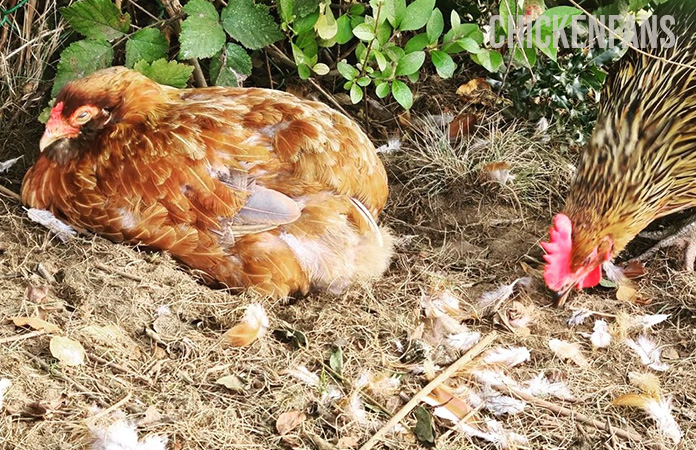
Loose feathers in the coop, bald patches on your hen’s back, or scruffy-looking feathers, are your chickens in need? Witnessing your chickens losing their feathers can be quite scary, but seasoned chicken keepers know there are various reasons why chickens experience feather loss. Let’s delve into the matter and find out whether or not it is a cause for concern.
Why Do Chickens Lose Their Feathers?
In most cases, feather loss in chickens is a natural and innocent process. But sometimes, the underlying cause may be more complex, requiring further investigation. Nonetheless, there is always a reason and a solution for addressing feather loss in your chickens.
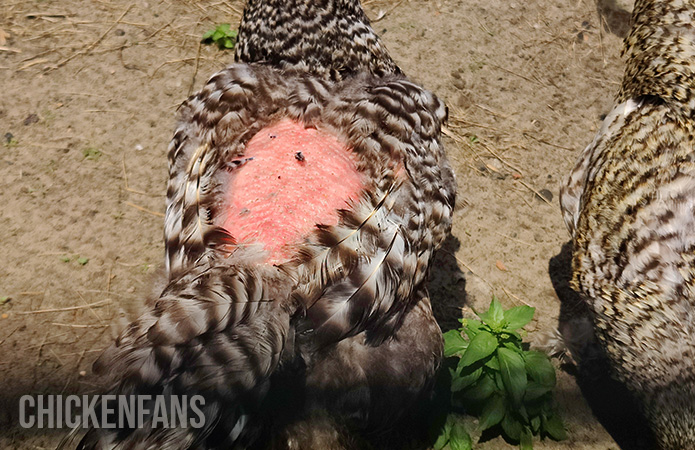
A chicken losing its feathers is not always a sign of illness. Usually, it’s that time of the year when your chicken molts to make way for a new set of feathers. In this instance, there’s nothing for you to worry about.
Factors like stress and the environment also play a role in your chicken losing its feathers. Sometimes, it’s a tell-tale sign that your chicken is either sick or suffers from a parasite infestation.
Below is a list of common reasons why your chicken is losing its feathers:
- Molting
- Lice
- Red Mites
- Favus
- Worms
- Bullying
- Aggressive Mating
- Boredom
- Predator Attack
- Stress
- Additionally: Broody hens
1. Molting
Those raising chickens in their backyard for the first time will undoubtedly start worrying when they find bald patches throughout the flock. However, it’s best to analyze the situation first.
If the cold season is fast approaching, then it’s highly likely that you’re dealing with molting. This is a normal phenomenon that happens just around the autumn season.
Your chickens start molting their feathers to help them prepare for winter. By losing their old, damaged feathers, the chickens will replace them with brand-new ones that can better withstand the cold.
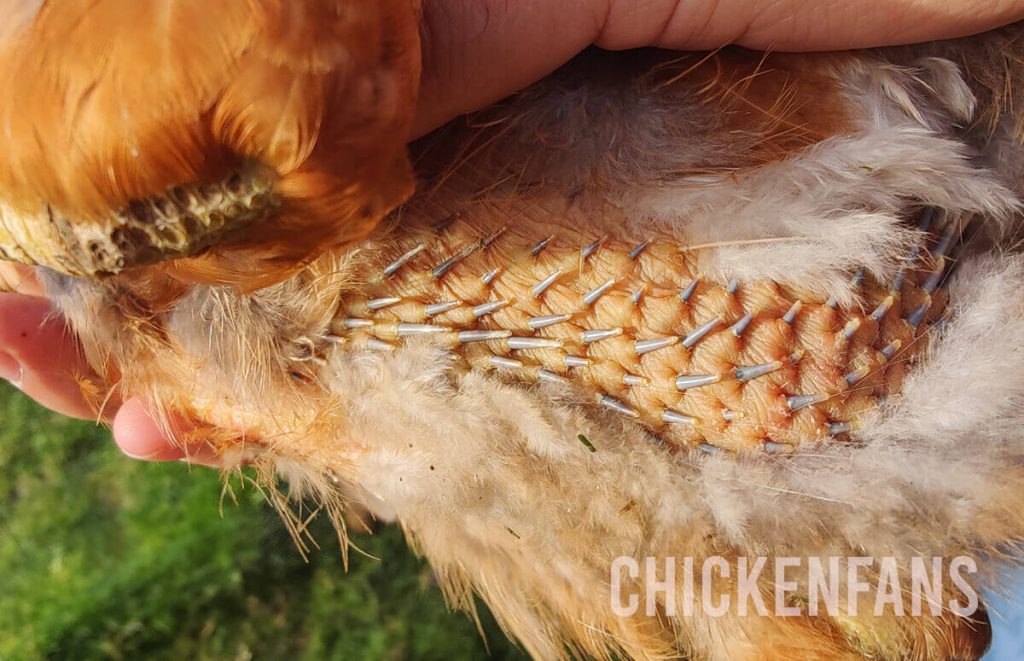
Mature birds that are 16 months and older exhibit this phenomenon once a year, and the whole process can take anywhere from 4 to 12 weeks or more. During molting, egg production slows down or stops entirely to focus on regrowing the feathers.
You can divide molting into two types: soft molting and hard molting. For chickens in the former category, they show almost no signs of molting, with only a few feathers falling off at a time.
Those in the latter category lose their feathers in bunches, showing off large patches of bare skin. However, a change in diet can help reduce the intensity.
Chicken feathers are more than 80% protein, making molting a demanding process for any chicken. Adding more protein to a chicken’s diet will help regrow the feathers faster and decrease the severity of the molting process. Experienced chicken keepers recommend a diet that consists of 20% protein.
2. Lice
One reason your chickens are losing feathers is due to the presence of parasites. A common example are lice.
These small but visible brown parasites cause significant discomfort, stress, and diseases in chickens. They can spread quite easily within a flock, so immediate attention is necessary when dealing with these critters.
If your chickens have dirty-looking vent feathers, bald spots, redness on the skin, and show reduced signs of activity, then there’s a high chance of an infestation. To check, part your chicken’s feathers near the vent and take a good look at the base of the feathers for any small, brown insects scurrying about.
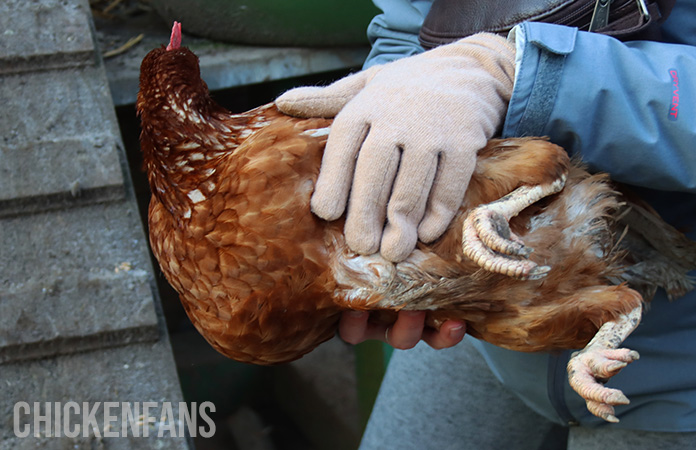
Lice feed on the dead skin and quill casings of the chicken. They can easily irritate your chickens’ skin, causing them to over-preen themselves.
Normally, chickens preening themselves is no cause for concern because that’s how they self-groom. But with lice, this can easily take a turn for the worse, eventually leading to chickens plucking their feathers to get rid of these parasites.
3. Red Mites
Other parasites that cause chickens to lose their feathers are red mites. Unlike lice, though, these parasites are a lot nastier and harder to get rid of.
Red mites are much harder to spot because they only come out at night to feed, and it takes them less than an hour to do so. They are seldom seen on the bird and hide in the cracks of your chicken coop or bedding. On top of that, they multiply rapidly, needing only a week for the eggs to turn into fully grown adults.
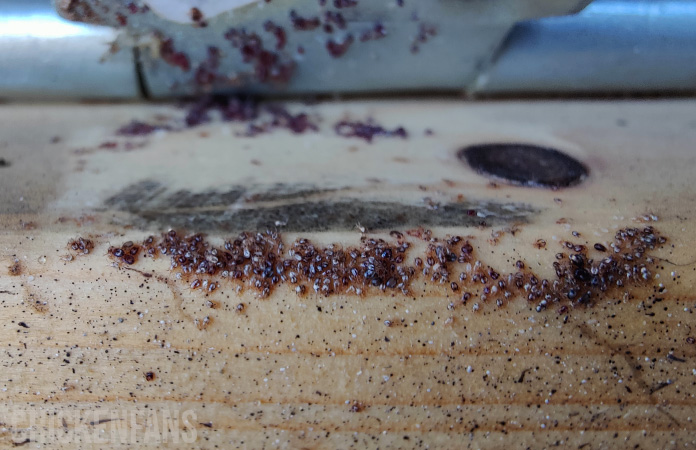
Like lice, a red mite infestation can cause stress and skin irritation in chickens, leading to feather plucking. In worst-case scenarios, it can also lead to cannibalism and even death.
In just a few days, your chickens can die of blood loss if you have a severe infestation on your hands.
Besides blood loss, red mites also carry a variety of diseases, such as Pasteurella, Erysipelas, E. coli, and Salmonella.
4. Favus
If you spot white, powdery spots on your chickens’ wattles and combs, it’s a sign that they could have favus. If left to develop, the infection will spread throughout the chicken’s body, causing the skin to thicken into a hard crust. When that happens, the feathers fall off in patches.
The hard crust also prevents new feathers from growing. In worst-case scenarios, it can permanently damage various parts of the chicken’s body, especially the beak and eyelids.
This also goes by another name, avian ringworm. However, this infection is due to a fungus, not a parasitic worm.
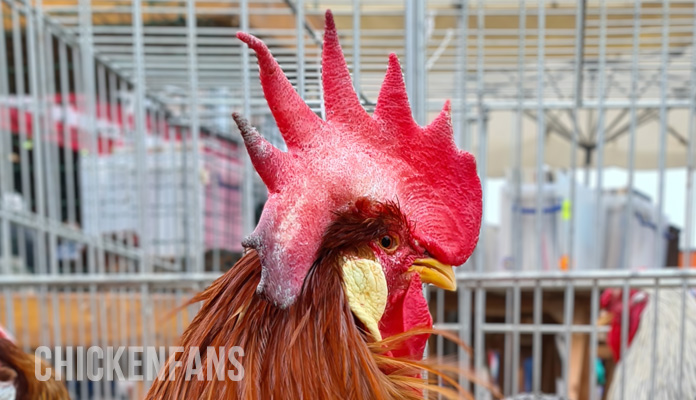
The reason for this is that humans can contract this infection. And it usually appears in circular rashes, hence the name.
5. Worms
A worm infestation in your flock can also cause feather loss. Typically caused by roundworms, these worms live in the intestines of birds and can cause various discomfort, such as diarrhea.
You can tell that your chicken is suffering from a worm infestation when you see worms in their droppings, inside their eggs, a lack of appetite, and dirty feathers, especially near the vent area. In the worst cases, it can lead to death.
Deworming your chickens every three to four months will help prevent this. Your chickens must be at least eight weeks old to undergo deworming, which can cause stress.
6. Bullying
Chickens always have a pecking order that they follow. Normally, chickens peck at each other to establish dominance in a flock, and it generally stops soon after, barring any dramatic change.
This usually happens when introducing a new bird to the flock. They will peck at each other to reestablish the hierarchy.
However, some chickens are just bullies. They will repeatedly peck at a chicken, preventing them from getting food or water. This usually happens if there’s insufficient space for all the chickens to roam around.
In most cases, losing a few feathers is not a cause for concern. But if the bullies start breaking into the chicken’s skin and drawing blood, that’s when you need to step in.
7. Aggressive Mating
Having an aggressive rooster or too many roosters in a flock can easily cause feather loss in the hens. When roosters mate, they tend to climb on the back of the hen and hold her down with their beaks and hind legs.
This can cause feathers to get loose. However, an aggressive rooster will not only cause feather loss, but it can also cause skin infections if they try to mate with the hens too much.
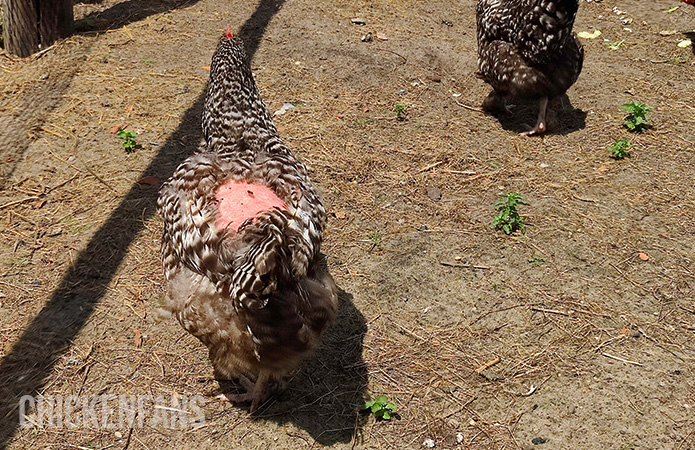
That’s why experienced chicken keepers recommend at least four hens for one rooster or a single rooster for an entire flock of hens. Removing him entirely from the flock is best if the rooster remains too aggressive during mating.
You can protect your hens during mating season with a chicken saddle.
8. Boredom
Chickens, just like humans, can also get bored. This normally happens when there’s not enough space for them to roam around or simply nothing to do.
In an attempt to distract themselves or relieve their boredom, chickens will pluck their feathers. It’s similar to how some people tend to twiddle their thumbs or bite their nails when they have nothing to do.
Luckily, this is quite easy to resolve. By simply giving them more space or adding some recreational toys to play with, they will stop their habit of plucking their feathers. Entertain them by making them ‘work’ for snacks, hide mealworms or make a vegetable pinata.
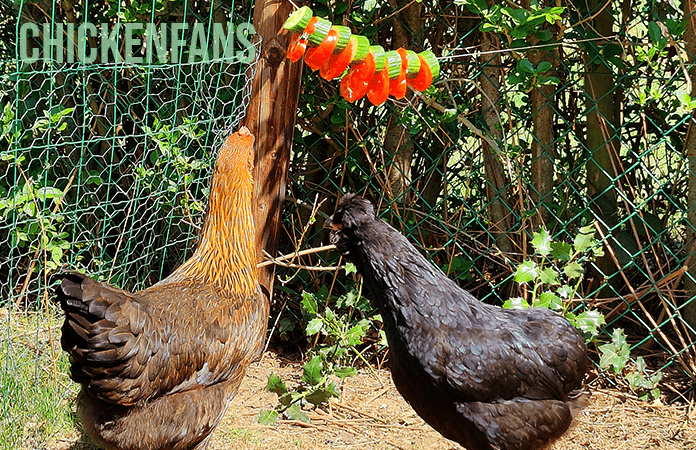
9. Predator Attack
If a predator attack happens to the flock, you’ll be lucky if a bunch of feathers are the only things missing. An experienced predator can leave behind just the feathers in most situations.
Even if the attacked bird does survive a predator attack, the trauma that comes with it is likely too much to handle. Loss of appetite and a drop in egg production are just some of the things that follow suit. Some will start molting as well to replace the missing and damaged feathers.
10. Stress
Chickens get stressed over a variety of things. Some of these include:
- Lack of food and water
- Not enough space
- Moving coops
- Loud noises
- Bright lights
- Fluctuating temperatures
- Change of environment
Many inexperienced chicken keepers don’t know that a routine is necessary. This provides a peaceful and stable environment for the chickens to live in.
Any sort of change, like introducing a new bird or feeding them late, can cause some chickens to feel stressed and start to molt. This doesn’t apply to all chickens, but you should keep that in mind if you plan on introducing something new to them.
Additionally: Broody hens
During broodiness, when a hen is consumed by an intense desire to hatch her eggs and nurture the future generation, she may also lose her chest feathers. As her maternal instincts take hold, hormonal changes occur within her body, leading to the shedding of feathers.
This feather loss results from the constant contact with the warm nest and the commitment to maintaining the ideal conditions for her eggs. While it may appear unusual, this natural process highlights the profound dedication of broody hens and is nothing to be alarmed about.
Summary
Chickens lose their feathers for various reasons, like molting, parasites, and stress. However, plenty of solutions are available to help the chickens in your flock deal with this problem. It just requires you to identify and understand why your chickens are losing their feathers.
If you want to read more about chicken health problems, symptoms, and diseases, check out our ‘Health Page‘. You’ll find a ‘Symptom Checker‘, a complete list of ‘Chicken Behavior‘, and an overview of the most common ‘Chicken Diseases‘. Or go to ‘The Classroom‘ and find a comprehensive list of all Chicken Fans articles.



















